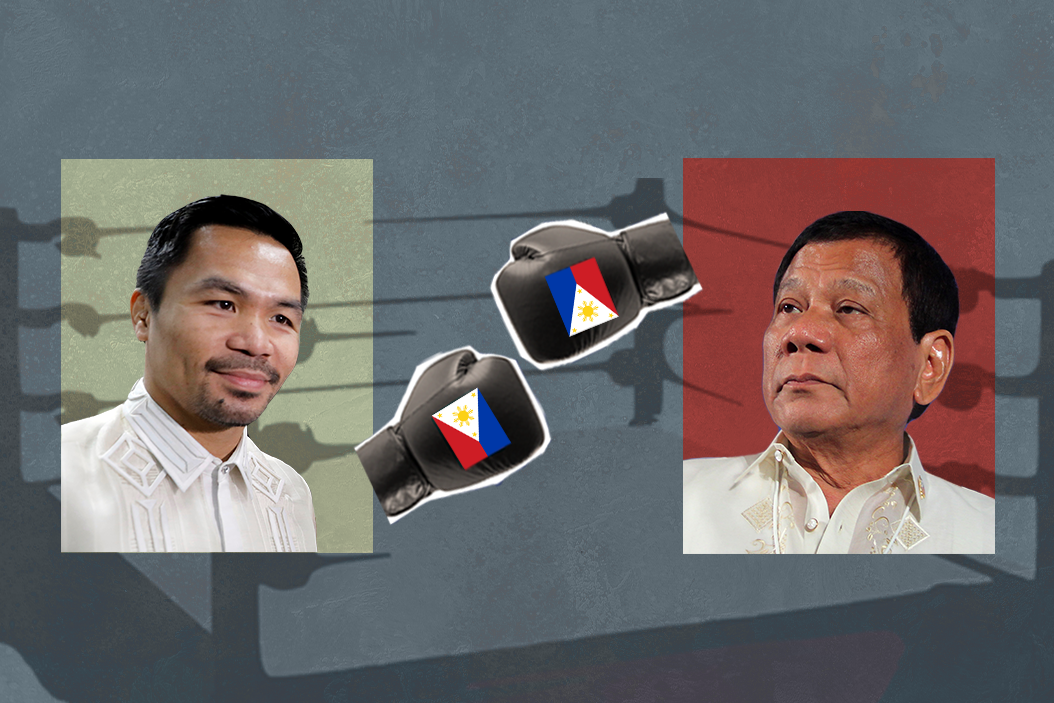Rodrigo Duterte, the tough-talking president of the Philippines, pulls no punches with his political opponents. But this time he's picking on a popular rival who speaks softly yet can actually throw a jab or two himself: boxing superstar Manny Pacquiao. Less than 10 months out from next year's presidential election, a recent public feud between the two could usher in an epic slugfest for the top job.
"Pacman" is immensely famous at home and abroad. He's considered the best pound-for-pound boxer of all time after winning world championship titles in more weight classes than anyone else. What's more, Pacquiao is a rare unifying force in the Philippines: guerrilla groups and the army usually call a truce and the entire country grinds to a halt to watch him fight. After rising from abject poverty to become a global icon and national celebrity, Pacquiao served two terms as a congressman, and in 2016 was elected senator.
From Duterte ally to enemy. Just weeks ago, Duterte was mentioning Pacquiao as a potential successor, in part because he supported Duterte's controversial war on drugs and anti-terror law. But in early June, when rumors of a Pacquiao presidential run started swirling, the two had a highly dramatic falling out.
Pacquiao first called out Duterte for being soft on China after failing to stand up to Xi Jinping over the presence of China's maritime militia in Philippine-claimed waters in the South China Sea. Then he accused the government of pocketing over $200 million in missing pandemic relief funds. Duterte, as expected, lashed out at Pacquiao, urging the senator to study foreign policy and daring him to show evidence of corruption.
Duterte-Duterte vs Pacquiao. Over the weekend, Pacquiao was ousted as leader of Duterte's ruling PDP-Laban party as payback for criticizing the president. In Philippine politics — where personality trumps ideology, and political parties serve as mere vehicles for candidates — Pacquiao's removal doesn't mean he can't run for president. If he does, though, it'll be against the wishes of powerful pro-administration politicians who dominate both houses of parliament.
In the Philippines, the only country in the world that elects a president and vice president separately for single terms, Duterte's party allies want him to run for vice president alongside his daughter Sara, current mayor of her dad's hometown of Davao. (Fun fact: Sara Duterte likes a good fistfight too.)
Strengths and weaknesses. For Aries Arugay, professor of political science at the University of the Philippines-Diliman, Pacquiao's fame and prominence are his best assets as a presidential candidate. His rags-to-riches story can be very potent as a political campaign because it "resonates well [with] a country with widespread socioeconomic inequality and exclusionary politics."
"The Filipino electorate historically like their politicians with grounded, authentic, and relatable narratives that can be converted to 'electability.' His weakness is his relative lack of political experience," says Arugay, who warns that Pacquiao's U-turn on Duterte "can be a bane, since Filipinos might construe this as his political ambition acting out and therefore a betrayal."
Pacquiao's odds. Although right now the Duterte-Duterte ticket is leading the polls while Pacquiao is in single digits, he's the only presidential hopeful with enough wealth to self-fund his campaign, and the name recognition to challenge the formidable daughter-father team. Pacquiao can appeal to Duterte's base of poor voters, and, being from the same region as the president, erode Duterte's strong support in vote-rich Mindanao.
Also, Pacquiao has recently honed in on what Arugay calls "low-hanging fruit": animosity toward China and tackling corruption. First, China's net trust rating among Filipinos is currently at a dismal -36. Second, poor Filipinos might turn on Duterte if Pacquiao offers credible proof of the president's alleged involvement in skimming funds intended to help those hit hardest by the COVID-induced economic wreckage.
He could even rally together the highly fragmented and overwhelmingly liberal opposition despite Pacquiao's deeply conservative views on issues like LGBT rights or the death penalty. Even if it "reeks of desperation," Arugay points out, "there have been stranger bedfellows" in previous Philippine elections.
What does his candidacy tell us about the state of Philippine politics? Although it's hardly surprising, says Arugay, "the bar on qualifications for the presidency not only remains low but actually has become lower." The country, he adds, is "trapped in political hell, wherein citizens only get to choose between legacy (dynasties) but incompetent, and celebrity but politically inept."
Duterte is worried about Pacquiao winning because he won't have immunity against prosecution as VP (it's common for incoming Philippine presidents to investigate their predecessors within months of taking office). Only his daughter would presumably give Duterte a free pass on corruption, human rights violations, or shady deals with China.
Stay tuned for August 21, when the boxing legend returns to the ring for the first time in two years. If Pacquiao, 42, beats an American fighter 11 years his junior, don't be surprised if Filipinos desperate for some good news amid the pandemic give the boxer-turned-senator a major bump in the polls — which Pacquiao could ride all the way to Malacañang Palace next year.